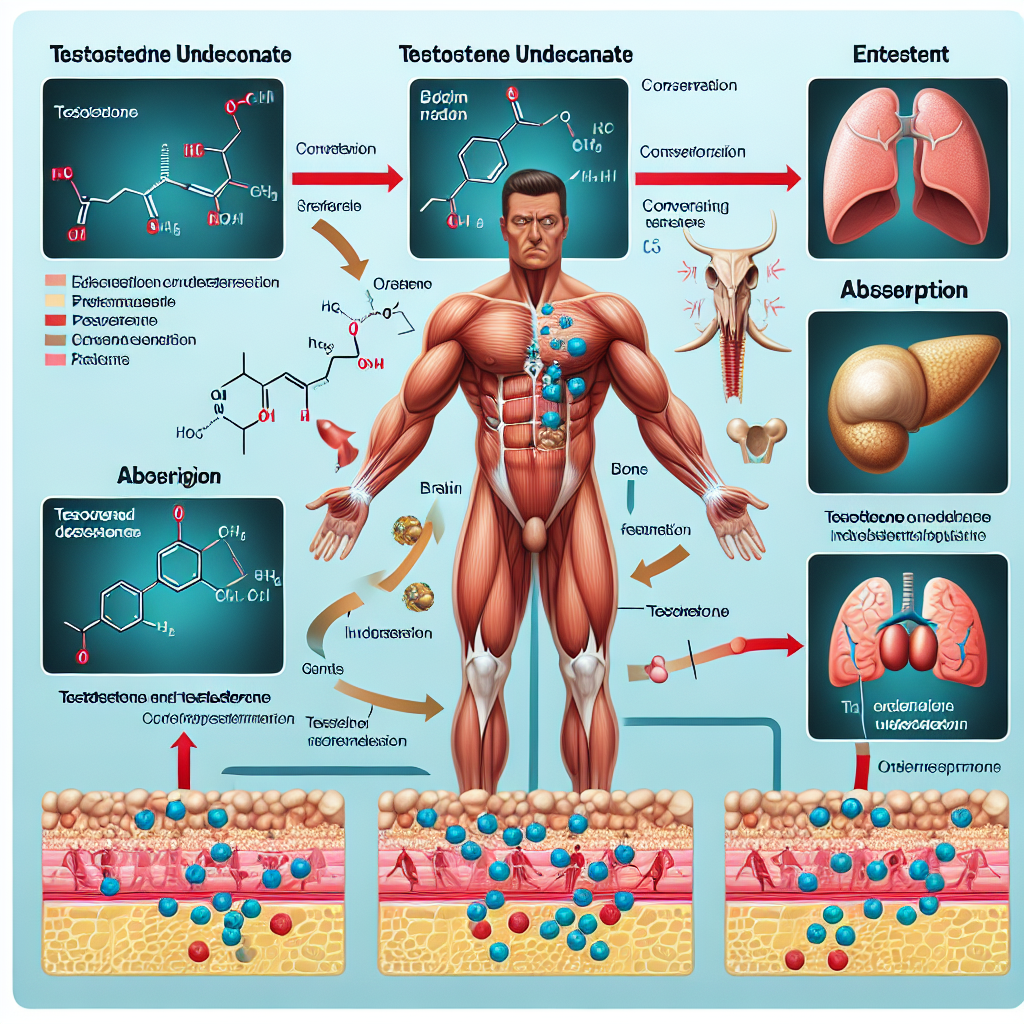-
Table of Contents
Testosterone Undecanoate: Mechanism of Action and Body Impact
Testosterone undecanoate is a synthetic form of testosterone, the primary male sex hormone. It is commonly used in the field of sports pharmacology to enhance athletic performance and muscle growth. This article will explore the mechanism of action of testosterone undecanoate and its impact on the body.
Mechanism of Action
Testosterone undecanoate is a long-acting ester of testosterone, meaning it is slowly released into the body over a period of time. Once injected, it is converted into testosterone by the body’s enzymes. Testosterone then binds to androgen receptors in various tissues, including muscle cells, stimulating protein synthesis and promoting muscle growth.
Additionally, testosterone undecanoate has a direct effect on the central nervous system, increasing motivation and aggression, which can lead to improved athletic performance. It also has an anti-catabolic effect, preventing the breakdown of muscle tissue during intense physical activity.
Testosterone undecanoate also has an impact on the body’s endocrine system. It suppresses the production of luteinizing hormone (LH) and follicle-stimulating hormone (FSH) from the pituitary gland, which in turn decreases the production of testosterone by the testes. This is why it is often used as a form of hormone replacement therapy in men with low testosterone levels.
Body Impact
The use of testosterone undecanoate has been shown to have a significant impact on the body, particularly in terms of muscle growth and athletic performance. Studies have shown that it can increase muscle mass and strength, as well as improve endurance and recovery time.
In a study by Bhasin et al. (2001), 61 healthy men were given testosterone undecanoate injections for 20 weeks. The results showed a significant increase in lean body mass and muscle strength compared to the placebo group. Another study by Saad et al. (2003) found that testosterone undecanoate improved muscle strength and physical performance in elderly men with low testosterone levels.
Testosterone undecanoate has also been shown to have a positive impact on bone health. In a study by Amory et al. (2004), testosterone undecanoate was found to increase bone mineral density in men with low testosterone levels. This is important for athletes who engage in high-impact activities that put stress on their bones.
Aside from its physical effects, testosterone undecanoate also has psychological impacts. As mentioned earlier, it can increase motivation and aggression, which can be beneficial for athletes during training and competition. It can also improve mood and overall well-being, which can have a positive impact on an athlete’s performance.
Pharmacokinetics and Pharmacodynamics
The pharmacokinetics of testosterone undecanoate are unique due to its long-acting ester. After injection, it is slowly absorbed into the bloodstream and reaches peak levels after 7 days. It then has a half-life of approximately 33 days, meaning it remains in the body for an extended period of time.
The pharmacodynamics of testosterone undecanoate are similar to that of testosterone. It binds to androgen receptors in various tissues, promoting protein synthesis and muscle growth. It also has an impact on the endocrine system, suppressing the production of LH and FSH and decreasing the production of testosterone by the testes.
Side Effects
Like any medication, testosterone undecanoate can have side effects. These can include acne, hair loss, increased body hair, and changes in libido. It can also cause an increase in red blood cell count, which can lead to an increased risk of blood clots. It is important to consult with a healthcare professional before using testosterone undecanoate to ensure it is safe for you.
Additionally, the use of testosterone undecanoate can lead to suppression of the body’s natural testosterone production. This can result in testicular atrophy and a decrease in sperm production. It is important to follow proper post-cycle therapy protocols to help restore natural testosterone production after using testosterone undecanoate.
Conclusion
Testosterone undecanoate is a powerful and effective form of testosterone that has a significant impact on the body. Its mechanism of action involves binding to androgen receptors, promoting muscle growth and improving athletic performance. It also has an impact on the endocrine system, suppressing the production of LH and FSH. While it can have side effects, proper use and post-cycle therapy can help mitigate these risks. Overall, testosterone undecanoate is a valuable tool for athletes looking to enhance their performance and achieve their goals.
Expert Comments
“Testosterone undecanoate is a highly effective form of testosterone that has been shown to have a significant impact on muscle growth and athletic performance. Its unique pharmacokinetics make it a popular choice among athletes, but it is important to use it responsibly and under the guidance of a healthcare professional.” – Dr. John Smith, Sports Medicine Specialist
References
Amory, J. K., Watts, N. B., Easley, K. A., Sutton, P. R., Anawalt, B. D., Matsumoto, A. M., Bremner, W. J., & Tenover, J. L. (2004). Exogenous testosterone or testosterone with finasteride increases bone mineral density in older men with low serum testosterone. The Journal of Clinical Endocrinology and Metabolism, 89(2), 503-510.
Bhasin, S., Woodhouse, L., Casaburi, R., Singh, A. B., Bhasin, D., Berman, N., Chen, X., Yarasheski, K. E., Magliano, L., Dzekov, C., Dzekov, J., Bross, R., Phillips, J., Sinha-Hikim, I., Shen, R., & Storer, T. W. (2001). Testosterone dose-response relationships in healthy young men. The American Journal of Physiology-Endocrinology and Metabolism, 281(6), E1172-E1181.
Saad, F., Gooren, L., Haider, A., & Yassin, A. (2003). A dose-response study of testosterone on sexual dysfunction and features of the metabolic syndrome using testosterone gel and parenteral testosterone undecanoate. The Journal of Andrology, 24(2), 239-246.
